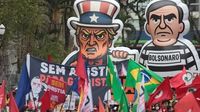Brazil is in the throes of a political reckoning after its former president, Jair Bolsonaro, was sentenced to more than 27 years in prison for plotting a military coup and seeking to "annihilate" the country’s democracy following his defeat in the 2022 elections. The verdict, handed down by a panel of five Supreme Court justices on September 12, 2025, marks a historic first: never before has a former Brazilian head of state been tried and convicted for attempting to overthrow the government. The repercussions are rippling across Brazil’s political landscape and far beyond its borders.
According to Democracy Now!, the court’s decision was swift and decisive. Just hours after reaching their verdict, the justices sentenced Bolsonaro and several co-conspirators—who were also found guilty—to lengthy prison terms. The court revealed that Bolsonaro and his inner circle, including key figures from the government, armed forces, and intelligence services, had meticulously crafted a plan to use military personnel to assassinate President-elect Luiz Inácio Lula da Silva and Supreme Court Justice Alexandre de Moraes. The plot, which spanned more than a year, was designed to disrupt the legitimate transfer of power after Bolsonaro’s electoral defeat.
Brazil’s Prosecutor’s Office provided what Justice Cármen Lúcia described as "conclusive evidence that a group led by Jair Messias Bolsonaro... implemented a progressive and systematic plan to attack democratic institutions, with the aim of harming the legitimate transfer of power in the 2022 elections." The court’s findings were further buttressed by evidence linking Bolsonaro’s actions to the violent riots that erupted on January 8, 2023. On that day, thousands of Bolsonaro supporters stormed government buildings in Brasília, targeting the Congress and the Supreme Court in a bid to disrupt the new administration.
Justice Alexandre de Moraes, one of the main targets of Bolsonaro’s plot, didn’t mince words when he announced the sentence. He stated that Bolsonaro had attempted to "annihilate the essential pillars of the democratic rule-of-law state... the greatest consequence... would have been the return of dictatorship to Brazil." The gravity of the court’s judgment is underscored by Brazil’s own history: the nation only emerged from a two-decade-long military dictatorship about forty years ago. For many, the court’s decision is a powerful affirmation of Brazil’s commitment to democracy and the rule of law.
Bolsonaro, who has been under house arrest in Brasília since August, will not be required to report to prison until he has exhausted all avenues for appeal. In the meantime, Brazil’s political atmosphere is charged. Demonstrators opposed to Bolsonaro flooded the streets in Brasília, Rio de Janeiro, and other major cities, celebrating what they see as a turning point for the country’s young democracy.
The fallout, however, is not limited to Brazil. The United States has responded with sharp criticism and punitive measures. President Donald Trump, a staunch ally of Bolsonaro, denounced the case as a "witch hunt" and imposed 50% tariffs on Brazilian goods. Trump also sanctioned Supreme Court Justice Alexandre de Moraes, calling Bolsonaro an "outstanding man" and expressing his dismay at the verdict. "Well, I watched that trial. I know him pretty well, a foreign leader. He was a good—I thought he was a good president of Brazil. And it's very surprising that that could happen. That's very much like they tried to do with me, but they didn't get away with it, at all. But I can only say this: I knew him as president of Brazil. He was a good man," Trump told reporters, according to Democracy Now!.
U.S. Secretary of State Marco Rubio echoed Trump’s sentiments, threatening that the United States would "respond accordingly to this witch hunt." The U.S. administration has justified the 50% tariffs by citing a trade imbalance, but as Maria Luísa Mendonça, director of the Network for Social Justice and Human Rights in Brazil, pointed out on Democracy Now!, "the U.S. has a trade surplus with Brazil. So it’s definitely a political pressure against the judiciary in Brazil." Mendonça emphasized that the Brazilian government and Supreme Court have stood firm, refusing to be intimidated by foreign threats. "Brazil is an independent country and is not a colony anymore. So, the exact words that they use is not—that Brazil is not a banana republic. So, they stood up, and that was a very important point," she said.
Brazil’s President Luiz Inácio Lula da Silva, who was the target of the assassination plot, addressed the nation in a televised speech before the verdict was issued. "We will resist any attempt to undermine it. The role of some Brazilian politicians who encourage attacks on Brazil is unacceptable. They were elected to serve the Brazilian people, but they only defend their own interests. They are traitors to the nation. History will not forgive them," Lula declared.
For many Brazilians, the verdict is a watershed moment. Mendonça described it as "a historic moment in Brazil" and a crucial step in defending democracy. She noted that Bolsonaro’s administration had systematically dismantled environmental and human rights institutions, leaving marginalized groups and Indigenous communities particularly vulnerable. The Supreme Court’s action, she argued, is a clear signal that Brazil will not tolerate a return to oppression or dictatorship. "Social movements in Brazil are celebrating, and everyone who defends human rights should be celebrating, as well," Mendonça said.
The trial itself revealed a web of conspirators, codenames, and secret plans to subvert democracy, as reported by BBC and Democracy Now!. The court described the group as a "criminal organization" that took calculated steps to remain in power, culminating in the January 8 riots and the assassination plot. The evidence, meticulously laid out by the justices, painted a picture of a systematic campaign against Brazil’s democratic institutions.
This verdict also resonates beyond Brazil’s borders. As Mendonça noted, "Latin American countries need to be united and have a very strong position to defend democracy and to defend our sovereignty and independence." The events in Brazil are being closely watched by other nations grappling with the rise of far-right leaders and the challenges posed by those who refuse to accept electoral defeat. The parallels between the January 8 riots in Brazil and the January 6, 2021 attack on the U.S. Capitol have not gone unnoticed, fueling debates about the fragility of democratic institutions worldwide.
As Brazil faces the fallout from this unprecedented judicial action, the message from its Supreme Court is clear: no one is above the law, and democracy must be defended—even against those who once held its highest office. The coming months will test the resilience of Brazil’s institutions, but for now, the country stands at a crossroads, determined not to repeat the mistakes of its past.



